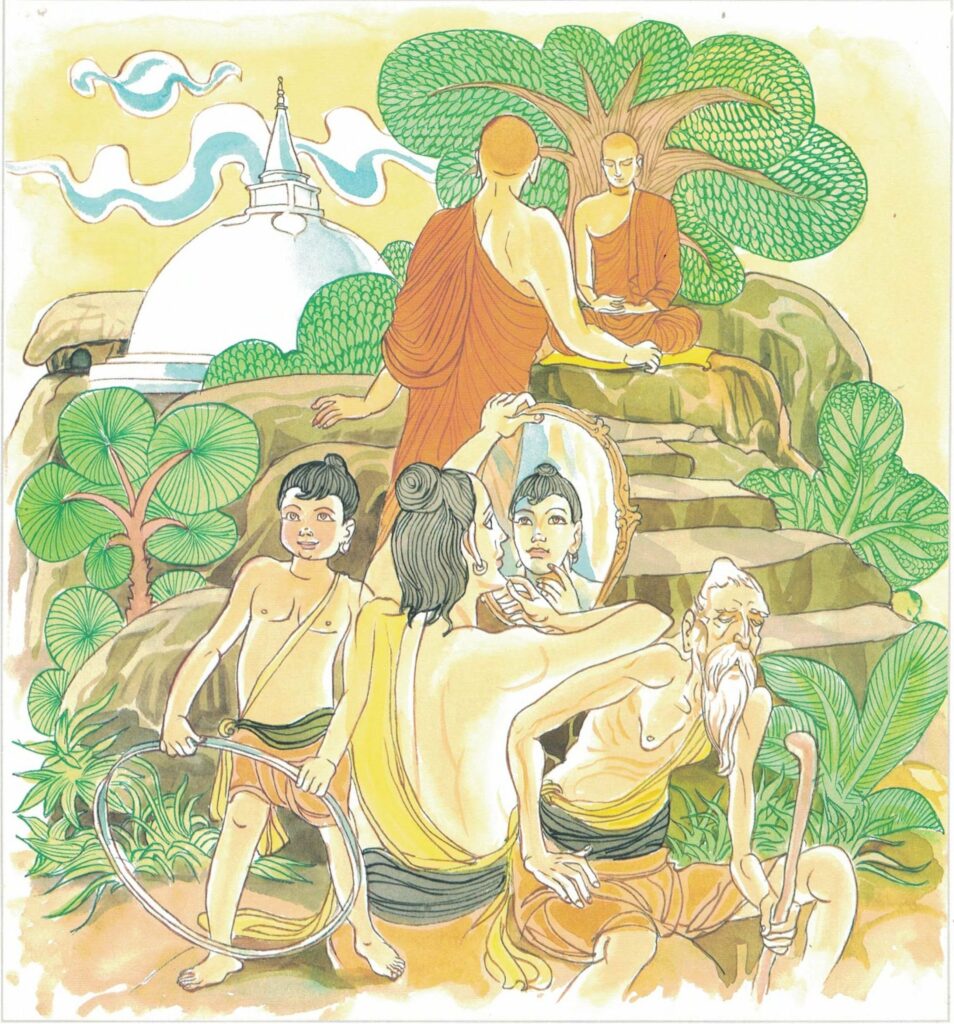Pali text, illustration and English translation of Dhammapada verse 157:
attānaṃ ce piyaṃ jaññā rakkheyya naṃ surakkhitaṃ |
tiṇṇam aññataraṃ yāmaṃ paṭijaggeyya paṇḍito || 157 ||
157. If one holds oneself as dear, protected, one protects oneself. One who’s wise should be aware through all the watches three.

The Story of Bodhirājakumāra
While residing at the Bhesakāla Wood, the Buddha spoke this verse, with reference to Prince Bodhi (Bodhirājakumāra).
Once, Prince Bodhi built a magnificent palace for himself. When the palace was finished he invited the Buddha for almsfood. For this special occasion, he had the building decorated and perfumed with four kinds of scents and incense. Also, a long length of cloth was spread on the floor, starting from the threshold to the interior of the room. Then, because he had no children, the prince made a solemn asseveration that if he were to have any children the Buddha should step on the cloth. When the Buddha came, Prince Bodhi respectfully requested the Buddha three times to enter the room. But the Buddha, instead of moving, only looked at Ānanda. Ānanda understood him and so asked Prince Bodhi to remove the cloth from the door-step. Then only, the Buddha entered the palace. The prince then offered delicious and choice food to the Buddha. After the meal, the prince asked the Buddha why he did not step on the cloth. The Buddha in turn asked the prince whether he had not spread the cloth making a solemn asseveration that if he were to be blessed with a child, the Buddha would step on it; and the prince replied in the affirmative. To him, the Buddha said that he and his wife were not going to have any children because of their past evil deeds. The Buddha then related their past story.
In one of their past existences, the prince and his wife were the sole survivors of a shipwreck. They were stranded on a deserted island, and there they lived by eating birds’ eggs, fledglings and birds, without any feeling of remorse at any time. For that evil deed, they would not be blessed with any children. If they had felt even a slight remorse for their deed at any stage of their lives, they could have a child or two in this existence. Then turning to the prince, the Buddha said, “One who loves himself should guard himself in all stages of life, or at least, during one stage in his life.”
Explanatory Translation (Verse 157)
ce attānaṃ piyaṃ jaññā naṃ surakkhitaṃ rakkheyya
paṇḍito tiṇṇaṃ aññataraṃ yāmaṃ paṭijaggeyya
ce: if; attānaṃ [attāna]: one’s own self; piyaṃ [piya]: one is affectionate to; jaññā: aware; naṃ: that self; surakkhitaṃ [surakkhita]: well protected; rakkheyya: safe-guard; paṇḍito [paṇḍita]: a wise person; tiṇṇaṃ aññataraṃ yāmaṃ [yāma]: during one of the three stages of life; paṭijaggeyya: acquire virtue for one’s protection
If you are aware that you are fond of your own self then protecting it is the best of safeguards. You must take measures to protect your self in one of the three stages of life–namely childhood, youth or old age. The best safeguard is the acquisition of virtue.
Commentary and exegetical material (Verse 157)
attānaṃ surakkhitaṃ rakkheyya: one’s own self well-protected, safeguarded. This admonition emphasizes the principal characteristic of Buddhism. The liberation of self is the responsibility of one’s own self. Someone else cannot do this for you. The difference of Buddhism from other religious systems is quite essential and to be appreciated. Rhys Davids asked the question: “What is meant by religion?” Its derivation is uncertain. Cicero, in one passage, derived it from re and lego, and held that its real meaning was the repetition of prayers and incantations. Another interpretation derives the word from re and logo, and makes its original sense that of attachment, of a continual binding (that is, no doubt to the deities). A third derivation connects the word with lex, and explains it as a law-abiding, scrupulously conscientious frame of mind.
Buddhism is not strictly a religion in the sense in which that word is commonly understood, for it is not a system of faith and worship, owing any allegiance to a supernatural deity. Buddhism does not demand blind faith from its adherents. Hence mere belief is dethroned and for it is substituted confidence based on knowledge. It is possible for a Buddhist to entertain occasional doubts until he attains the first stage of sainthood (sotāpatti) when all doubts about the Buddha, Dhamma, and the sangha are completely resolved. One becomes a genuine follower of the Buddha only after attaining this stage.
The confidence of a follower of the Buddha is like that of a patient in respect of a noted physician, or of a student regarding his teacher. Although a Buddhist seeks refuge in the Buddha as his incomparable guide and teacher who indicates the path of purity, he makes no servile surrender. A Buddhist does not think that he can gain purity merely by seeking refuge in the Buddha or by mere faith in Him. It is not within the power even of a Buddha to wash away the impurities of others. Strictly speaking, one can neither purify nor defile another. The Buddha, as teacher, may be instrumental, but we ourselves are responsible for our purification. A Buddhist is not a slave to a book or to any individual. Nor does he sacrifice his freedom of thought by becoming a follower of the Buddha. He is at full liberty to exercise his own freewill and develop his knowledge even to the extent of attaining Buddhahood, for all are potential Buddhas. Naturally Buddhists quote the Buddha as their authority, but the Buddha discarded all authority.